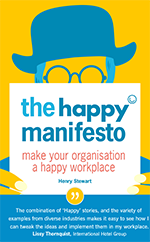Let People Choose Their Managers
Imagine one of your most valued members of staff comes to you and says, ‘I love my job. I love the people I work with. I am even happy with what I am being paid. But I can’t stand my manager.’
Hi, we are Happy
We are leading a movement to create happy, empowered and productive workplaces.
How can we help you and your people to find joy in at least 80% of your work?
If the conflict can’t be resolved the most common outcome is that they will leave.
A study by the Chartered Management Institute UK found that 47% of respondents in the UK left their last role because they were badly managed and that 49% would be prepared to take a pay cut to be able to work with a different manager.
At Happy, we can solve it in about five minutes. We simply ask who they would like instead as their manager.
This may not be common but Happy is not alone in this approach. At WL Gore, the multi-billion company behind Goretex, they also let people choose their managers, arguing that “if you want to be a leader, you’d better find some followers.”
The results are interesting. Some people do change their managers because they don’t get on with them. Others have changed because they’ve become too close, while some feel the need for a new guide for the next stage of their development. If you do find everybody deserts a certain manager it probably tells you something important about their strengths and weaknesses and where they need to develop.
Professor Julian Birkinshaw of London Business School asks, “what would management be like if it was decided by those who are managed?” Probably both different and more effective, I would say. And being able to choose who manages you would make simple sense.
We do have a slightly different structure to the norm, with the person who manages and coaches you often separated from the person who you deliver work to. But that isn’t so unusual nowadays. Many people work on projects where the Project Leader is not their line manager.
So think about it. Would you hold onto more employees? Would they grow new skills? Would you create a happier workplace if you let people choose their managers?
Keep informed about happy workplaces
Sign up to Henry's monthly Happy Manifesto newsletter, full of tips and inspiration to help you to create a happy, engaged workplace.

Learn the 10 core principles to create a happy and productive workplace in Henry Stewart's book, The Happy Manifesto.
Henry's Most Popular Blogs
- 8 Companies That Celebrate Mistakes
- 9 Benefits of Having Happy Employees
- 321Zero: How I Solved my Email Overload
- 16 Companies That Don't Have Managers
- 5 Big Companies Who Swear by Mindfulness
- 49 Steps to a Happy Workplace
- A Four Day Week? Let's Start With a Four Day August
- Google: Hire Great People and Give Them Lots of Autonomy
- Buurtzorg: No Managers, Just Great Care From a Nurse-Led Service
- 30 Steps to Joy at Work: Get More Done by Being Less Busy

Henry Stewart, Founder and Chief Happiness Officer
Henry is founder and Chief Happiness Officer of Happy Ltd, originally set up as Happy Computers in 1987. Inspired by Ricardo Semler’s book Maverick, he has built a company which has won multiple awards for some of the best customer service in the country and being one of the UK’s best places to work.
Henry was listed in the Guru Radar of the Thinkers 50 list of the most influential management thinkers in the world. "He is one of the thinkers who we believe will shape the future of business," explained list compiler Stuart Crainer.
His first book, Relax, was published in 2009. His second book, the Happy Manifesto, was published in 2013 and was short-listed for Business Book of the Year.
You can find Henry on LinkedIn and follow @happyhenry on Twitter.
Next Conference: Women in Leadership Online Conference
Save the date for our online conference on 12th November 2025, celebrating women in leadership.
You will hear from inspiring female leaders about how they have created happy and empowered workplaces.
There will be interaction, discussion, space for reflection and opportunities to network with other leaders.
Related courses
The Happy Leadership Programme
Brave Leadership: One-Year Leadership Development Programme for Women
Level 7 Senior Leadership Apprenticeship Programme
Not what you need? Take a look at all of our off-the-shelf Leadership and Management programmes.